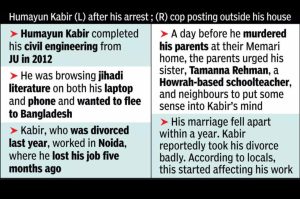West Bengal Terror Trail: In a deeply unsettling incident in West Bengal, Humayun Kabir, a 35-year-old civil engineer and Jadavpur University alumnus, stands accused of committing two heinoaus acts: the brutal murder of his parents in Memari, East Burdwan, and a violent attack on staff members of a madrasa in Bongaon, near the Bangladesh border. This case has drawn significant attention due to its chilling nature and the underlying factors contributing to such extreme actions.
West Bengal Terror Trail: Background of Humayun Kabir
Humayun Kabir’s life trajectory paints a picture of a man grappling with personal and professional challenges. After completing his civil engineering degree in 2012, Kabir worked in Noida but lost his job five months prior to the incidents. Following this, his father brought him back to their ancestral home in Memari. Kabir’s personal life also faced turmoil; he had been divorced the previous year, an event that reportedly had a profound impact on him. His ex-wife, a geography postgraduate, did not support his rigid religious views, leading to the dissolution of their marriage. Kabir’s parents and sister attempted to dissuade him from his extremist ideologies, but their efforts were met with resistance.
Radicalization and Online Influence
Investigations reveal that Kabir had been extensively consuming jihadi literature on his laptop and mobile devices. Authorities discovered that he had been browsing extremist content online, which likely played a role in his radicalization. Kabir’s online activities included accessing materials that glorified martyrdom and portrayed violence as a means to attain spiritual rewards. This digital exposure to radical ideologies, coupled with his personal grievances, may have contributed to his violent actions.
The Murders in Memari
On the morning of May 28, 2025, Kabir allegedly murdered his parents, Musfatizur Rahman and Mumtaj Parveen, at their residence in Memari. The brutality of the act was compounded by Kabir dragging their bloodied bodies into the street, an action that shocked the local community. Neighbors reported that Kabir had expressed resentment towards his parents, accusing them of mistreating the poor, which he perceived as un-Islamic. He also believed that they were not true followers of Islam, further straining familial relations.
Attack on the Madrasa in Bongaon
Later the same day, Kabir traveled approximately 130 kilometers to Bongaon, near the India-Bangladesh border. There, he attacked four individuals at the Hafizia Kharizia Orphanage Madrasa with a machete. The madrasa, located just six kilometers from the Bangladesh border, was chosen by Kabir due to its proximity, possibly indicating a plan to flee to Bangladesh after the attack. The victims, all staff members, sustained injuries but survived the assault. Kabir reportedly posed bizarre and inappropriate questions to the madrasa staff about Islamic teachings before launching the attack. His motive, as per initial investigations, was to attain “Jannat” (paradise) through this act, suggesting a deeply misguided interpretation of religious tenets.
Public Reaction and Arrest
The brutality of the attacks led to widespread panic and outrage. A mob gathered at the Bongaon police station, demanding that Kabir be handed over to them. The situation escalated, resulting in a lathicharge by the police and the arrest of several individuals for rioting and attacking law enforcement officers. Kabir was subsequently arrested and remanded in police custody for three days. Authorities are investigating his extremist affiliations and motives, with Kabir currently in custody under judicial remand.
Investigations and Legal Proceedings
Following Kabir’s arrest, law enforcement agencies have been working to uncover the full extent of his radicalization and any potential connections to extremist groups. The knife used in the attacks was reportedly purchased online, raising concerns about the accessibility of weapons and the role of e-commerce platforms in facilitating such purchases. Investigators are also looking into Kabir’s online activities to determine the sources of the jihadi content he consumed and whether he had any affiliations with banned organizations.
Broader Implications
This incident highlights several critical issues:
-
Online Radicalization: The case underscores the dangers of unregulated access to extremist content on the internet and the need for effective monitoring and countermeasures.
-
Mental Health and Social Support: Kabir’s personal struggles, including job loss and divorce, may have contributed to his radicalization. This emphasizes the importance of mental health support and community engagement in preventing such tragedies.
-
Security Concerns: The proximity of the madrasa to the Bangladesh border raises questions about the security of educational institutions and the potential for cross-border radicalization.
The case of Humayun Kabir serves as a stark reminder of the complex interplay between personal grievances, online radicalization, and violent extremism. It calls for a multifaceted approach to address these challenges, including stricter regulation of online content, enhanced mental health support systems, and increased vigilance at educational institutions. Only through comprehensive efforts can such incidents be prevented in the future.
DO FOLLOW:
Also read: Home | Channel 6 Network – Latest News, Breaking Updates: Politics, Business, Tech & More


